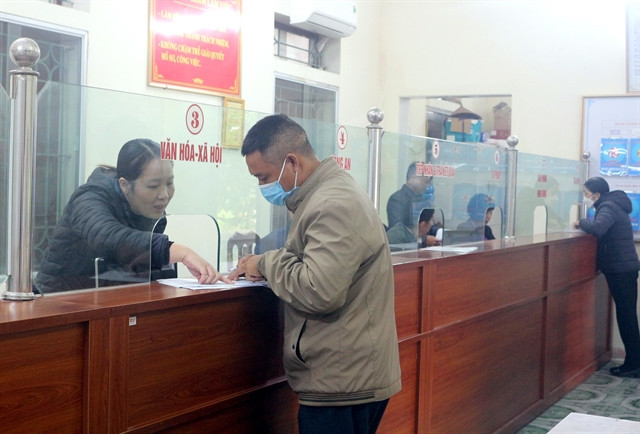 |
|
State workers at the administrative centre in Bình Lục District, Hà Nam Province, instruct citizens to complete procedures. |
The new salary regime, part of a larger plan for comprehensive salary reform, was to have been implemented in 2021, but it was postponed due to the outbreak of the COVID-19 pandemic.
Although she has been a state worker for more than 10 years, the income of Trần Thị Phượng (not her real name) is not equal to that of a new graduate who works for a private enterprise.
Phượng works for a ward-level office in Hà Nội.
Coming from a suburban district of Hà Nội, Phượng went to HCM City to study at university.
In 2012, after graduating, she worked at a business in the city with a starting salary of VNĐ5 million (US$205) per month.
But her family in the north hoped for and urged her to return to Hà Nội.
Phượng had to leave behind her plans in the busiest city of the country.
After passing the state worker entrance exam, her starting salary at that time was only VNĐ3 million ($123) per month.
Three years ago, she started working at an administrative ward office. Now her monthly income is over VNĐ6 million ($246).
"Thanks to the increase in basic salary from VNĐ1.4 million to VNĐ1.8 million from July 1, I have this income," said Phượng.
For an unmarried person, the above income is enough to cover expenses. But for her, this income makes it really difficult to maintain her daily life when she has to support the whole family.
"I have many times wanted to find a job in a private enterprise. But I heard that minimum salary reform was about to be implemented, so I tried to wait longer to see if the change would be better," Phượng said.
Nguyễn Văn Đúng is another example.
Đúng has been working as a teacher at a high school in District 1, HCM City for 15 years.
Now he receives nearly VNĐ8 million ($328) per month.
"With that salary it is difficult to ensure family life, especially when we have small children, and the cost of their studying and daily life is increasing,” said Đúng.
“Even for a single person who lives in a rented house and spends sparingly, a salary of VNĐ8 million only meets the minimum needs, enough for survival, and cannot cover communication or learning anything more," he said.
Đúng hopes that after reform, his salary will be enough to cover his own life and take care of his family and children.
“In my opinion, salary reform needs to keep pace with the spiralling prices every year. Because while wages have not increased, prices have already increased," Đúng told the Dân Trí e-newspaper.
Huỳnh Thị Huệ (not her real name) is also a teacher in Gò Vấp District, HCM City.
Huệ said her monthly income was just enough for basic daily expenses. Further goals such as buying a house or a car remained out of reach.
Huệ hopes that with salary reform, teachers in particular and state workers in general will have good incomes, a better living standard, and can build savings to buy houses and cars.
Phượng, Đúng and Huệ are among more than 1.7 million people working and receiving salaries from the State budget, according to statistics in 2021.
According to Ministry of Home Affairs (MoHA) statistics, from 2020 to the first six months of last year nearly 40,000 public employees quit their jobs, or 1.94 per cent of all public employees.
Most of them work in health and education.
The MoHA analysed that low salary which cannot meet essential needs was among many reasons leading to this situation.
Attracting experts has not been done well; many people with good knowledge and professional qualifications choose the private sector with better remuneration policies.
Việt Nam is set to implement a new salary regime for the public sector from July 1 next year.
The new salary regime is part of a larger plan for comprehensive salary reform being drafted by the Government in accordance with Resolution 27-NQ/TW on reforming the country's wage policies, adopted at the 7th plenum of the 12th Party Central Committee.
The new salary regime should have been implemented in 2021, however it was postponed due to the outbreak of the COVID-19 pandemic.
As of July 1 this year, basic salary for cadres, public servants and armed forces' personnel increased by 20.8 per cent to VNĐ1.8 million ($73.7) a month.
Basic salary is the basis for calculating salaries of employees in the State-run sector by multiplying it with their corresponding coefficient. For example, a new graduate entering the State sector will get a salary of level one with a coefficient of 2.34, equivalent to a monthly wage of VNĐ4.2 million at present. — VNS